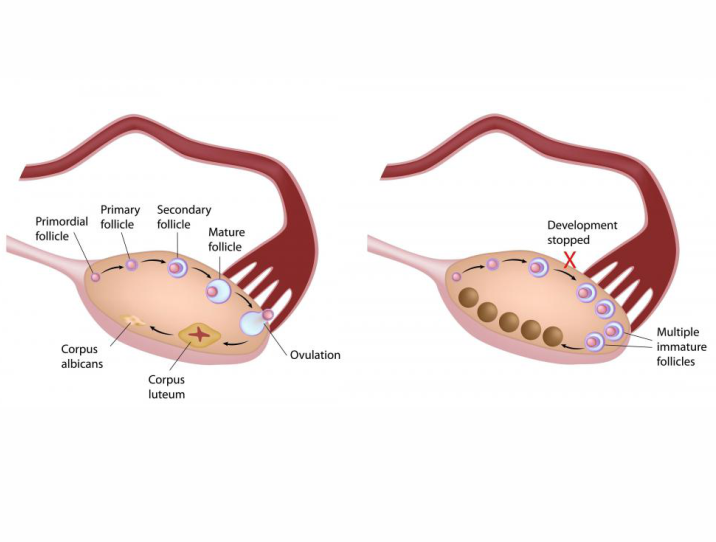
Polycystic Ovarian Syndrome (PCOS)
DEFINITION
Polycystic ovary syndrome is a problem which can cause problem in a woman’s menstrual cycle (monthly period) and getting pregnant due to imbalance of hormones like estrogen and progesterone in body.
Women who suffer from PCOS develop several small cysts on their ovaries, which can be seen during an ultrasound exam. That is why it is called polycystic ovary syndrome. The cysts are not harmful but lead to hormone imbalances.
PCOS can cause problems with a women’s menstrual cycle, fertility, and appearance (excessive hair growth, acne). If it isn’t treated, over time it can lead to serious health problems, such as diabetes and heart disease.
CAUSES
The cause of PCOS is not fully understood, but genetics may be a factor. Recent research suggests that PCOS is related to insulin resistance and the development of diabetes, especially in women who are overweight.
Excess insulin may cause high androgen levels. Overproduction of the hormone androgen (male hormone) which women also produce may be another contributing factor for PCOS.
SYMPTOMS
There are a number of signs and symptoms women with PCOS can have. However, not every woman with PCOS will have every symptom, and each woman will be quite individual in her experience. Symptoms of PCOS typically start soon after a woman begins to menstruate, which includes
- Irregular periods.
- Excess facial and body hair
- Acne
- Weight gain
- Anxiety or Depression
- Polycystic ovaries
DIAGNOSIS
There is no definitive test for PCOS. PCOS is usually diagnosed based on the woman’s history and a physical and pelvic examination to look for signs of PCOS. It may be confirmed by ultrasound and by measuring hormone levels in the blood.
TREATMENT
The treatment will vary from woman to woman, depending on specific symptoms. It generally focuses on management of individual’s main concerns, such as infertility, hirsutism, acne or obesity.
Gynaecologist will firstly suggest lifestyle change with the motive of weight reduction, which can help improving one’s condition. Medications will be targeted on regulating menstrual cycle or aiming fertility or reducing hair growth.
It is important to see your doctor for follow-up to make sure that treatment is working and to adjust it if needed. It may take a while for treatments to help with symptoms such as facial hair or acne
COMPLICATIONS
Polycystic ovary syndrome (PCOS) causes a wide range of symptoms, so it may be hard to know when to see the doctor. The earlier your PCOS is diagnosed and treated, the lower your risk of developing complications like heart attack, diabetes, endometrial cancer.
Women with PCOS have a higher rate of miscarriage, gestational diabetes, and premature delivery, and may need extra monitoring during pregnancy and attention from a gynaecologist who specializes in high-risk pregnancies.
